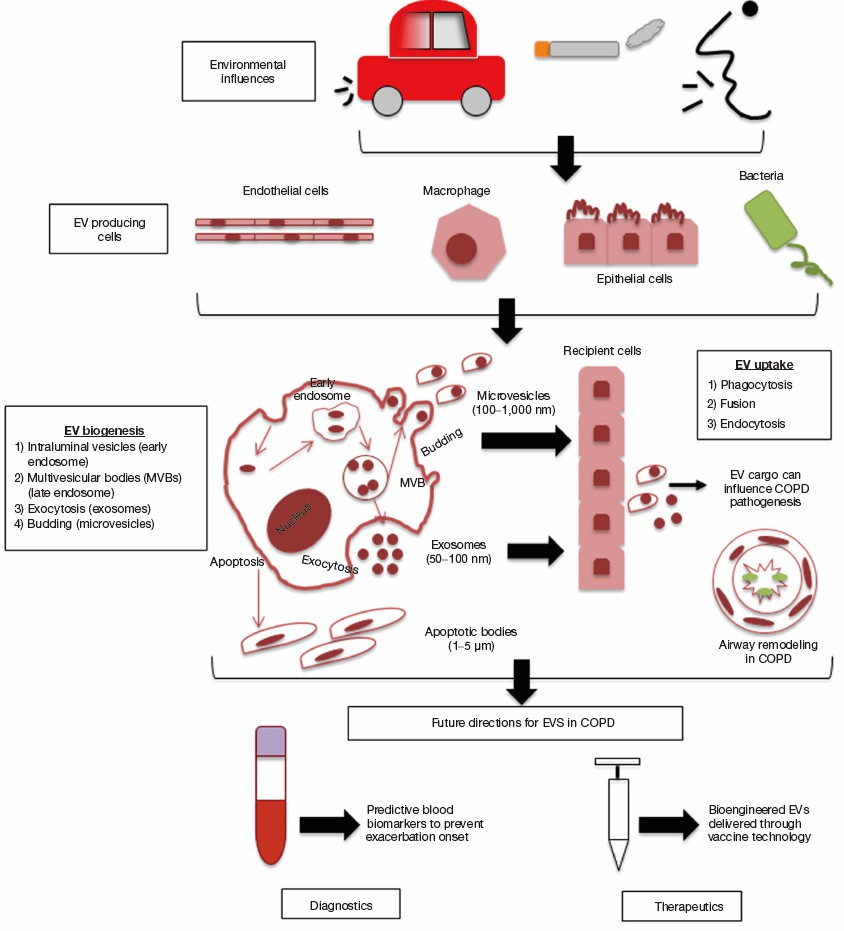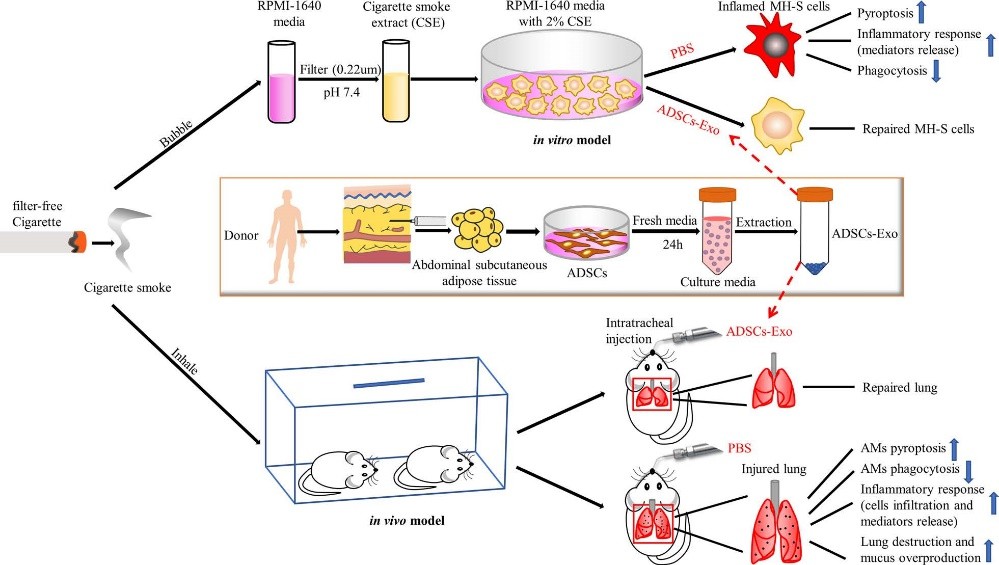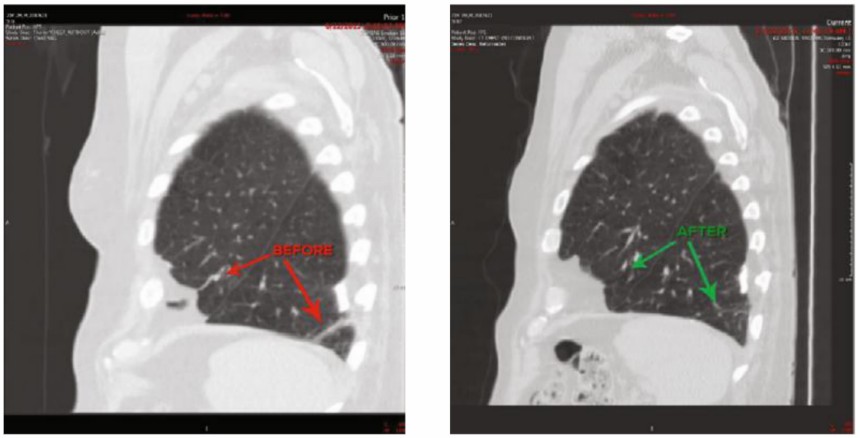Therapeutic Exosomes for Chronic Obstructive Pulmonary Disease
Chronic obstructive pulmonary disease (COPD) is a lung disease characterized by airflow limitation. The airflow limitation is not fully reversible and progresses progressively, mainly involving the lungs. A variety of stem cell-derived exosomes has been found to significantly improve COPD. Creative Biolabs has a mature exosome-related technology platform and professional talent team, which can provide strength for exosome drug discovery in COPD.
Chronic Obstructive Pulmonary Disease (COPD) and Exosomes
COPD is a chronic inflammatory lung disease with high morbidity and mortality. COPD is characterized by persistent respiratory symptoms and airflow limitation. The main clinical manifestations are shortness of breath, cough, sputum, and in severe cases, there is a risk of respiratory failure. The adaptive immune response to COPD is closely related to cigarette smoke (CS), air pollution, and other harmful irritating particles. CS, in particular, is a major risk factor for developing COPD. Prolonged inflammatory responses in the airways can lead to airway remodeling, and emphysema, and even aggravate the disease. As an intercellular communication tool, exosomes affect the physiological and pathological processes of COPD. In normal lung physiology, exosomes may play a key role in maintaining homeostasis through cell-to-cell communication in the human airway. However, endothelial cells, macrophages, epithelial cells, and airway microorganisms stimulated by external harmful substances can secrete exosomes whose contents have been changed to reach different sites, thereby affecting the progression of COPD. Compared with healthy controls who never smoked, miR-181c is significantly down-regulated in exosomes of COPD patients, and the down-regulation of miR-181c may lead to increased expression of cysteine rich angiogenic inducer 61 (CCN1), which in turn promotes the COPD inflammatory response.
 Fig.1 Biogenesis of extracellular vesicles in relation to COPD.1,4
Fig.1 Biogenesis of extracellular vesicles in relation to COPD.1,4
Therapeutic Exosomes for COPD
Compared with their parental MSCs, exosomes have better safety and stability and are considered a promising cell-free therapy candidate for COPD. Long-term CS stimulation results in a marked increase in mitochondrial fission proteins and damage-associated molecular patterns (DAMPs) in lung epithelial cells, leading to mitochondrial dysfunction in lung epithelial cells. It has been found that in CS-induced COPD mice, intraperitoneal injection of bone marrow mesenchymal stem cells (BMSCs) and BMSCs-derived exosome (BMSCs-Exo) can alleviate COPD by anti-inflammatory and targeting mitochondrial genes. Compared with BMSCs alone or their exosomes, combination therapy has a better therapeutic effect. In addition, human adipose-derived stem cells-derived exosomes (hADSCs-Exo) have also been found to alleviate COPD. In a CS-induced COPD mouse model, hADSCs-Exo reduced lung inflammation, airway mucus overproduction, and lung injury by inhibiting the pyroptosis of alveolar macrophages (AMs).
 Fig.2 Administration of hADSCs-Exo ameliorated CS-induced lung inflammation, mucus overproduction, and injury as well as AMs pyroptosis.2,4
Fig.2 Administration of hADSCs-Exo ameliorated CS-induced lung inflammation, mucus overproduction, and injury as well as AMs pyroptosis.2,4
Placental mesenchymal stem cell exosome-derived multiple allogeneic protein paracrine signaling (P-MSC-Exo-MAPPS) by reducing inflammatory cytokines (TNF-α, IL-1β, IL-12, and IFN-γ), and increasing IL-10 and IFN-γ Regulatory T cells (Tregs) reduce COPD-related lung inflammation. Furthermore, P-MSC-Exo-MAPPS treatment significantly improved the lung condition of 30 COPD patients, and none of them experienced any adverse effects.
 Fig.3 Representative computed tomography images before and after 1 month of P-MSC-Exo-MAPPS treatment of COPD patients.3,4
Fig.3 Representative computed tomography images before and after 1 month of P-MSC-Exo-MAPPS treatment of COPD patients.3,4
Creative Biolabs provides a one-stop service from exosome extraction to exosome loading, to in vivo and in vitro functional verification. Please feel free to contact us with your ideas and needs, and we will arrange for experienced scientists to follow up on your project.
References
-
Kadota, T.; et al. Extracellular Vesicles in Chronic Obstructive Pulmonary Disease. International Journal of Molecular Sciences. 2016, 17(11):1801.
-
Zhu, Z.; et al. Exosomes derived from adipose-derived stem cells alleviate cigarette smoke-induced lung inflammation and injury by inhibiting alveolar macrophages pyroptosis. Respiratory Research. 2022, 23(1):5.
-
Harrell, CR.; et al. Molecular and Cellular Mechanisms Responsible for Beneficial Effects of Mesenchymal Stem Cell-Derived Product "Exo-d-MAPPS" in Attenuation of Chronic Airway Inflammation. Analytical Cellular Pathology (Amsterdam). 2020, 2020:3153891.
-
under Open Access license CC BY 4.0, without modification.
For Research Use Only. Cannot be used by patients.
Related Services:

 Fig.1 Biogenesis of extracellular vesicles in relation to COPD.1,4
Fig.1 Biogenesis of extracellular vesicles in relation to COPD.1,4
 Fig.2 Administration of hADSCs-Exo ameliorated CS-induced lung inflammation, mucus overproduction, and injury as well as AMs pyroptosis.2,4
Fig.2 Administration of hADSCs-Exo ameliorated CS-induced lung inflammation, mucus overproduction, and injury as well as AMs pyroptosis.2,4
 Fig.3 Representative computed tomography images before and after 1 month of P-MSC-Exo-MAPPS treatment of COPD patients.3,4
Fig.3 Representative computed tomography images before and after 1 month of P-MSC-Exo-MAPPS treatment of COPD patients.3,4









